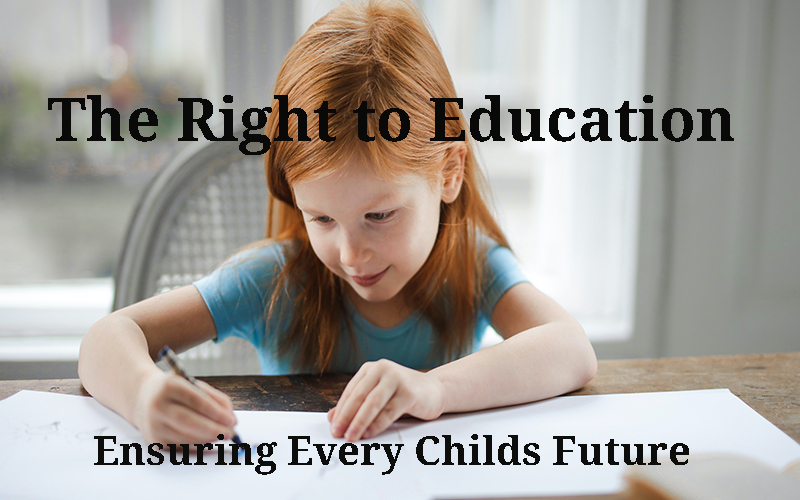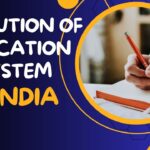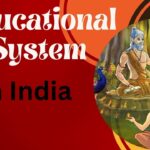Right to education – Psychological development of love towards our own country and utilization of talents in our country without emigration to foreign countries, can change the present scenario. Hence education system of a country is a measure of its growth and development.


Right to education is a right that provides free and compulsory elementary education along with study materials, food, books and clothing in a school in the neighborhood. Right to education is one of the fundamental rights given by our constitution in order to educate all children of the country especially the poor. Right to education is a powerful tool to help children in poverty to come up in life with the help of education. Education builds a person to take responsibility of house and family. It is a fundamental right where children can easily access the schools for their education.
When we see the world as whole there are many countries with million children not being educated. The reasons for these include poverty, financial deficit in developing countries, lack of schools and education systems, lack of knowledge and awareness on importance of education to children, lack of materials and equipment followed by lack of teachers, inequality between girls and boys.
Components
On 4th August 2009 parliament of India enacted an act that is right to education act, 2009 which changed the whole path of education system. This act came into force on April 1, 2010. This right provided compulsory and free education to children along with provision of free materials, uniforms, textbooks and stationery items. Along with India there are 135 other countries who have set Education as a right. It has also provided appointment of new teachers, safe drinking water and toilet facilities too. This act also takes care of number of teachers to pupil ratio in a school, separate toilets for girls and boys, working hours of teachers. This right prohibits all kind of harassment, mental torture, punishments, abuse, discrimination of class, caste, religion. This act also provides development of curriculum for the all round development of the child. It has created many committees to supervise the school system and education. This act provides freedom to society to complain on any harassment or abuse for justice. It provides 25 percent reserved seats for socially disadvantaged and economical weaker sections.
Features
The main features of the right to education act include availability, accessibility, acceptability, adaptability.
Importance
Constitution framed this right so that education system can be created through schools and colleges in various locations by providing safe school building, play ground, providing quality education by teachers using learning materials and equipment. This right has reduced the child labor and child marriage. Along with this education should be free of all types of violence and safe for girls, children with disabilities. Children of rural areas especially get benefited by this right. It has eliminated the financial barrier and most of the reasons and factor barriers.
Benefits
Physical and cognitive development, improving intelligence and brain activity, understanding socialization and interaction with others, development of human personality, developing peaceful society, providing sustainable economic development, building nations by enriching it with culture, value and identity and elimination of social inequality in gender and castes towards education are its benefits.
• Physical growth and development – when children go to schools they have sessions to play and do activities. This builds up their physical body and keeps them active. Children play different types of games and sports in the playground of the school with the help of play materials provided to them. This also creates interest in sports and extracurricular activities. Exercise and body movements are important for physical growth and development of a child. During the growing age child needs to play various indoor and outdoor activities and foster the skills and techniques. A further improvement can be done when children are taught about self defense in schools and colleges and create awareness about how physical health is important for one’s wellbeing.
• Psychological growth and development – schools create a learning environment where children not only involve in studying their subjects but also creating new hobbies of their interest. It can be singing, drawing, dancing, acting and some other art and crafts. This refreshes the child’s mind and helps him to get a stable mind. The child becomes strong mentally. He or she will know about life challenges and will be ready to face them and brighten their future career.
• Social growth and development – children interact with other students. They talk, share ideas, discuss, do group activities, project hence learn to do team work and respect others words and decisions. They learn to live with people by improving their communication skills. Interaction with the class students make them stronger socially. Moral values and education taught in school help children to interact with others and future in their life they inculcate the same values for a better life.
• National growth and development – No doubt the child is developed healthy physically mentally and socially through education. But how does educating children build nation? Will educating children help in development of the nation? If yes, then how? It is said that educating women in a family in turn educates the whole family. When children are educated about hygiene and health topics, there will be reduction in the spreading of various communicable diseases. Government has the chance to create new programmes of awareness and speech talk sessions at schools. Conducting health checkup for all students every year keeps a track of health status and helps in early diagnosis. There are opportunities to create free health checkups and camps that can be benefited by the students. Vaccination and immunization to school children also can be done at that place.
We know that in ancient times female were not allowed to go to schools. In present scenario this has changed. We have also seen that most of the top rank holders nowadays are females. Education system has solved all these inequalities. Awareness about child marriage, child labor, dowry.. all these have made society more strong mentally to face challenges. At last the country’s development depends on the educated people in it. Educated people are the assets of the nation. They are the powerful tool for economic growth and development.
The topic of education is always incomplete without the sayings of swami Vivekananda. He has contributed towards education a lot and empowered the young minds to continue education. He said “we want education by which character is formed, strength of mind is increased, the intellect is expanded and by which one can stand on one’s own feet.” He describes that the very essence of education is the concentration of mind. This shows that recent student problems like lack of concentration, distractions from studies all these can be solved only through education. Education is a never ending process. You learn throughout your life. It is said that the secret of life is not enjoyment but learning through experience. “A nation is advanced in proportion to education and intelligence spread among the masses”. “Educate and raise the masses, and thus alone a nation is possible”. The above two quotes of swami Vivekananda can truly change a nation.
Latest advancements
Our prime minister Narendra Modiji has introduced new educational policy that would act as a foundation for India’s 21st century education system by developing students into global citizens who are rooted with values and culture of our nation. This policy aims to transform Indian Education system by 2040. It reflects the ideals of Guru Rabindranath on Education which aims at bringing our lives in harmony with all the existence. This policy provided a holistic approach that was achieved successfully. Our former Vice president M.Venkaiah Naidu said, under National education policy 2020 that all school children would be provided with nutritious breakfast . Quote of our former president APJ Abdul Kalam says “The purpose of Education is to make good human beings with skill and expertise.” This improves peace and non violence in nation. Education been taught in mother tongue till class 5 is another improvement that would help the child to understand better and strengthen the learning power. This policy also says that no one will be forced to study any particular language and the medium of instruction will only be in English. It also ensures that talent of India remains in India and helps in development of our nation thus reducing brain drain also.
Dr. Rashmi Bhat











